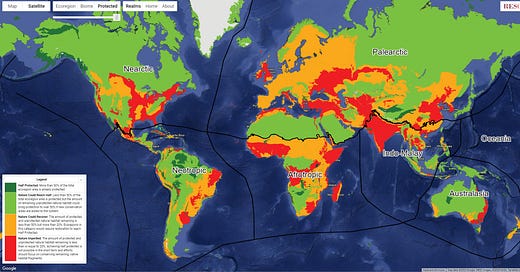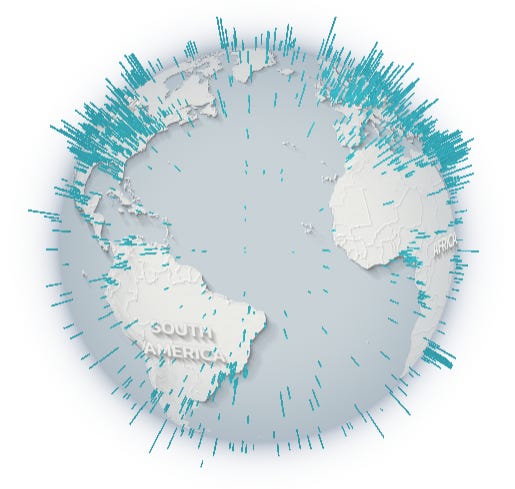Mind Expanding 14 Jul 2023:🌍regrowth economics💩enshittification and the crap-ocalypse🤖AI and the burden of knowledge 🧬evolution of the minimal cell🧠second brain🌌cosmic bass note🐁Universe 25
Choose life. Choose a job. Choose a career. Choose a family...
Mind Expanding is my ~fortnightly curation for Memia subscribers of links to deeper dives and bigger thinks and other eclectica that I’ve come across while compiling the weekly newsletter. Thanks for reading!
In today’s post:
🌍Regrowth Economics exploring a new monetary model aligning incentives with biodiversity
📚Other Climate Reading on technology, degrowth and climate doom-loops
💩Enshittification and the Crap-ocalypse - Cory Doctorow and Ted Gioia on the AI-driven deterioration of the online world
🤖Thinking about AI some deeper thinking and insights about the impact of artificial intelligence from George Monbiot, Ethan Mollick, Bruce Sterling and Mario Gabriele
🧬Biotech new breakthroughs in biotechnology including J. Craig Venter Institute’s latest work exploring the evolution of the “minimal cell”.
🌌 Cosmology thinking about the universe's evolution, the detection of a “cosmic bass note” of gravitational waves and the Panspermia hypothesis.
📚 Reading latest additions to the virtual bookshelf including a new book from Deepmind (and now Inflection AI) co-founder Mustafa Suleyman.
🎧 Listening a podcast on building a “Second Brain” with Jerry Michalski, now in his 24th year of curating “Jerry’s Brain” online.
🎁 Miscellany some not-altogether-uplifting stories, including what to eat in a global catastrophe, the ultra-dark Universe 25 rodent society experiment from the early 1970s and Trainspotting at 30.
Enjoy!
ICYMI
Here’s a roundup of my public speaking and media appearances in the first half of the year:
🗣️Memia speaking and media appearances roundup Jan-Jun 2023
Kia ora folks, Apologies I’ve had a lot of things going on in the last week and my workload has finally caught up with me… I’ve had to skip this week’s scheduled ⏩Fast Forward Aotearoa newsletter and instalment. Normal service will be resumed next week…
🌍Regrowth economics
Riffing a bit further on Wednesday’s Memia post:
Ultimately, the world’s global economic and monetary system is broken. Pretty much every climate and biodiversity metric shows that Western capitalism (…and Chinese “state communism” just as much…) is destroying the planet’s ecological resources at an alarming rate. Optimistically, slowing and starting to reverse these trends will take at least 2 decades:

Even the FT is running increasingly urgent commentary on this:
”Climate change requires …new theories. To fix a system’s breakdown, we need to fix the system that causes it: capitalism. But our theories are predicated on maintaining that system, searching for ways to make “the business case” and gain market advantage when addressing climate change. That is as absurd as making the business case to not commit suicide. We prioritise the bottom line when the practices that contribute to it threaten the survival of the planet: the endless pursuit of economic growth, a view of nature as merely a limitless source for materials and sink for wastes, and the mindless consumption that drives it. We are facing an existential crisis, not an exercise in theoretical advancement.
In response, research theories must now treat economic systems as intertwined with the primacy of natural ones. Otherwise, by 2030, damage to the global climate will be irreversible regardless of the ushering in of new technologies and business models. We need to be more fully engaged with the natural world during our studies and more fully engaged with the social world in sharing our findings.“
The EU’s recent 2023 Strategic Foresight Report agrees:
“The need for a new economic model, focused on the wellbeing of people and nature, decoupling economic growth from resource use and shifting to more sustainable production and consumption. Up to 75% of Eurozone businesses are highly dependent on natural resources. Economic, social and environmental sustainability are inextricably linked.“
Kate Raworth’s Doughnut Economics from 2017 sets out a framework for conceptualising “overshoot”…
…but so far, lots of talk (me included…). No definitive answers. No action.
Given the growing urgency of the crisis, my thinking is turning towards ways to reframe the global economy *beyond* “sustainability” and towards “regeneration”? I came across this excellent thread from Robert Ferry proposing a new foundation for “Regrowth Economics”:
Ultimately the big idea:
What if, in order for central banks and governments to write more wealth into existence ("print money"), they would be required to demonstrate to the world that they had made some real and measurable progress on environmental regeneration?
Effectively, re-introduce a global monetary standard. Instead of gold, or Bitcoin, constrain money supply based upon ecological restoration, enforcing staying within the planet’s ecological boundaries. And by doing so (the theory goes…) this would align economic incentives with biodiversity.
There are plenty of data resources out there upon which to base such a standard:
As covered on Wednesday, the Global Footprint Network manage the Ecological Footprint which forms the basis of Earth Overshoot Day.
ClimateTrace: Independent Greenhouse Gas Emissions Tracking:
PurpleAir - Crowdsourced global air quality monitoring
Also the Ecoregions 2017 resource from RESOLVE, based upon an important 2017 scientific paper: An Ecoregion-Based Approach to Protecting Half the Terrestrial Realm.
“How can we save life on Earth? It happens within each community, ecoregion, and country as we choose to leave room for nature to thrive. This map charts our progress.
Scientists now believe that to avoid the worst of the current extinction crisis and to keep temperature rise below 2oC and also avoid negative biospheric feedbacks, as much as 50% of the land and seas must be kept natural. To this end, we can convert the ecoregions map into a tool for measuring our progress towards the goal of half-protected where lands could be under various forms of conservation management and ownership, from government, to indigenous peoples' or privately-held lands. The map presented here intersects the amount of habitat now protected and the amount of unprotected habitat remaining that could be brought under conservation“
Overcoming the Oracle Problem
But *HOW* do you base global money supply on biocapacity indicators? Let’s leave that story for another day… but the fact we’ve been using outdated macroeconomic models based upon a unconstrained USD de facto reserve currency means it’s certainly highly feasible.
One of the key challenges will be to get around the classic “oracle problem” — familiar to those working with blockchain technology — effectively how to validate ecological data sources as “objective” (eg reliable to an agreed level of consensus) rather than “subjective” before placing them onto a shared (blockchain…) ledger and using them for a smart contract (eg to regulate money supply).
This opens up a whole can of technical worms… but I imagine that there are some decentralised consensus oracle services being developed out there right now to provide accurate measurement of ecological indicators.
(Kim Stanley Robinson went some way to describing a similar mechanism with the “Carbon Coin” in his book Ministry for the Future).
Sidestepping political inertia
Incumbent political and financial power structures will be mortally threatened by these changes and will create a depressing inertial drag which will last for decades to come…
But the unavoidable fact is… momentum towards ecological regeneration needs to be increased *NOW*…there is no time to wait for governments and UN talking shops… Simply put: humanity needs to prioritise whatever it takes to place over 50% of the planet’s surface permanently under managed conservation, regrowth economics or no economics.
Grassroots up initiatives
The mission to restore 50% of global surface back to nature will need to start from the grassroots up. And this will need to happen *in parallel with* lagging changes to global ecological and economic governance, however long that takes.
Some grassroots initiatives I’m tracking (thanks again Robert Ferry for some of the links):
Ecosystem Restoration Communities: A global movement of everyday people that are reversing ecological destruction across six continents.
Common Land: Restoring landscapes to create a brighter future on planet Earth
Homegrown national park: a US initiative encouraging native planting:
"In the past, we have asked one thing of our gardens: that they be pretty. Now they have to support life, sequester carbon, feed pollinators and manage water."
A couple of initiatives here in my home country Aotearoa:
The New Zealand Plant Conservation Network vision is that “the rich, diverse and unique native plant life of New Zealand is recognised, cherished and restored”.
Regenerate New Zealand aims to crowdfund purchases of pine tree blocks and restore back to native forests after harvesting
I’m sure there are some crypto-token initiatives bubbling around which are working on providing an “oracle” on the Ethereum (or other cryptocurrency) networks… upon which a parallel economy might start developing for these grassroots initiatives, trading goods and services grounded on biodiversity. Then let’s wait a few years until governments catchup with a biodiversity credits system.
📚Other climate reading
Two other climate links worth delving into:
Just dreaming? Jason Hikkel: On technology and degrowth
“In sum, green growth scenarios play loose with science, assume incredibly unjust arrangements, and gamble with the future of humanity—and all of life on Earth—simply to maintain ever-increasing levels of aggregate output in high-income countries, which, as we will see, is not even needed.
Ecological economists point out that when we scale back our assumptions about technological change to levels that are, to quote the physicist and ecological economist Julia Steinberger, “non-insane,” and when we reject the idea that growth in rich countries should be maintained at the expense of the Global South, it becomes clear that relying on technological change is not enough, in and of itself, to solve the ecological crisis. Yes, we need fast renewable energy deployment, efficiency improvements, and dissemination of advanced technology (induction stoves, efficient appliances, heat pumps, electric trains, and so on). But we also need high-income countries dramatically to reduce aggregate energy and material use, at a speed faster than what efficiency improvements alone could possibly hope to deliver. To achieve this, high-income countries need to abandon growth as an objective and actively scale down less necessary forms of production, to reduce excess energy and material use directly.“
Ecological doom-loops John Dearing, Gregory Cooper and Simon Willcock: Why ecosystem collapses may occur much sooner than expected
“Around the world, rainforests are becoming savanna or farmland, savanna is drying out and turning into desert, and icy tundra is thawing. Indeed, scientific studies have now recorded "regime shifts" like these in more than 20 different types of ecosystem where tipping points have been passed. Around the world, more than 20% of ecosystems are in danger of shifting or collapsing into something different.
These collapses might happen sooner than you'd think. Humans are already putting ecosystems under pressure in many different ways—what we refer to as stresses. And when you combine these stresses with an increase in climate-driven extreme weather, the date these tipping points are crossed could be brought forward by as much as 80%.“
💩Enshittification and the crap-ocaplyse
Such a great new word from independent writer Cory Doctorow: TikTok’s Enshittification:

“Here is how platforms die: first, they are good to their users; then they abuse their users to make things better for their business customers; finally, they abuse those business customers to claw back all the value for themselves. Then, they die.
I call this enshittification, and it is a seemingly inevitable consequence arising from the combination of the ease of changing how a platform allocates value, combined with the nature of a "two sided market," where a platform sits between buyers and sellers, holding each hostage to the other, raking off an ever-larger share of the value that passes between them.“
Here he is discussing the problem with ABC’s Future Tense Podcast: Cory Doctorow: Platform capitalism and the curse of "enshittification".
Meanwhile writer Ted Gioia explores similar themes in 30 signs you are living in an Information Crap-ocalypse:
Keep reading with a 7-day free trial
Subscribe to Memia to keep reading this post and get 7 days of free access to the full post archives.











